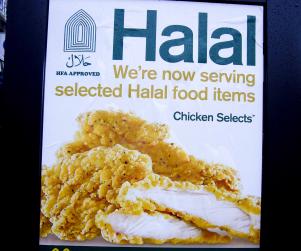McDonald’s Corp. paid $700,000 to members of the Muslim community in
Detroit after a franchise falsely advertised that food on its menu was
prepared in accordance with Islamic law.
McDonald’s agreed to a tentative settlement in January, and it was
finalized Wednesday by Wayne County Circuit Judge Kathleen Macdonald.
In September 2011, Ahmed Ahmed of Dearborn Heights said he bought a
halal chicken sandwich at a nearby McDonald’s, which he found did not
meet Islamic requirements for food preparation.
Much like kosher food, halal must be prepared separately from
non-halal food. Allah’s name must be invoked before the slaughtering of
an animal for consumption in Islamic law.
The McDonald’s in Dearborn is one of two in the area that serves a large Arab and Muslim population.
The class action lawsuit brought against McDonald’s by Ahmed and his
attorney, Kassem Dakhlallah, alleged the franchise sold non-halal food
“on many occasions.”
The settlement will be shared amongst Ahmed, the Arab National Museum
in Dearborn, a Muslim-run health clinic in Detroit, and attorneys.
"As a firm, we've borne the burden of litigating this case for over
19 months, and have paid a steep price in time and money to do so,"
Dakhlallah told The Associated Press in an email. "We are happy that we
are able to finalize this case and get the settlement funds paid to the
Huda Clinic to be used for medical care for the community, and to the
Arab American National Museum to be used to allow our young ones to
continue their educations after high school."
The restaurant’s franchisee, Finley's Management, said in the
settlement notice it "has a carefully designed system for preparing and
serving halal such that halal chicken products are labeled, stored,
refrigerated, and cooked in halal-only areas." They said employees are
trained in the halal food preparation and know it "requires strict
adherence to the process."
Attorney for McDonald's, Thomas McNeill, said the investigations and
settlement proved that if a problem arose with their halal products, "it
was isolated and rare.

nice article thanks for the post
ReplyDeletekajal hot